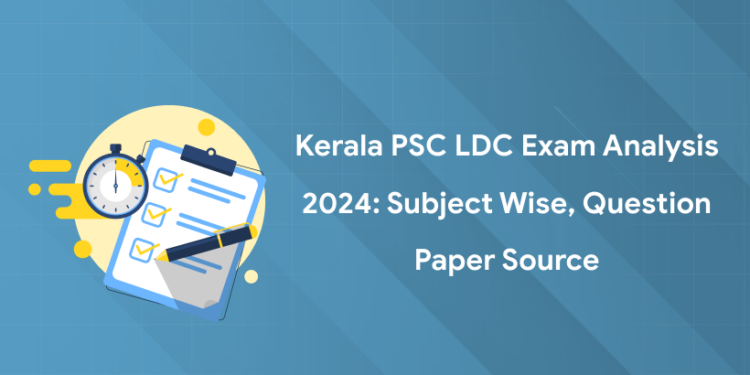Table of Contents
The Kerala PSC Lower Division Clerk (LDC) Exam for the 503/2023 category is currently underway, with exams already completed in Kannur, Kollam, and Thiruvananthapuram. Additional exams are scheduled to continue until the end of October 2024. As the examination process progresses, we have decided to provide a detailed Kerala PSC LDC exam analysis for the 503/2023 category.
In this analysis, we offer a snapshot of the subject-wise distribution and difficulty levels from the exams conducted so far. For a comprehensive breakdown and ongoing updates, we are continuously analyzing the LDC exams. Stay tuned for more insights and updates as the examination process progresses. Check out the detailed review now!
Kerala PSC LDC Exam 2024: Detailed Subject-Wise Analysis & Difficulty Levels
Kerala PSC LDC exam analysis 2024 provides a concise overview of the subject-wise distribution and difficulty levels in the LDC Exams held so far. It highlights key insights and trends to help candidates better prepare for the test.
Kerala PSC LDC Exam Analysis – For Kollam & Kannur
1: Which Year First Assembly Election was held in Kerala?
The Kerala PSC Lower Division Clerk (LDC) Exam analysis for the 503/2023 category in Kannur provides a snapshot of the subject-wise distribution and difficulty levels, helping you understand the exam patterns and prepare effectively for future tests.
1. History (6 marks)
Questions Distribution: 1 from Kerala, 2 from India, and 3 from world history.
- Difficulty Distribution:
- Easy: 4
- Tough: 2
Analysis: The history section was relatively straightforward, with a majority of easy questions. The inclusion of questions from world history suggests that candidates should be well-versed in global historical events in addition to regional and national history.
2. Current Affairs (5 marks)
- Number of Questions: 5
Analysis: The current affairs segment had a significant weightage and included a range of questions. Given its importance, regular updates and reviews of recent events and developments were crucial for scoring well in this section.
Enroll in Kerala's Top-rated Kerala PSC Coaching Program!
സർക്കാർ ജോലി എന്ന സ്വപ്നം ഇനി സ്വപ്നം മാത്രമല്ല! Join Entri's Kerala PSC Coaching Programs
Join Now!In-Depth Analysis of Kerala PSC LDC Questions: Kannur & Kollam Districts
Explore the subject-wise analysis and detailed answers for the Kerala PSC LDC Exam (Category 503/2023) specific to Kannur and Kollam districts.
3. Geography (6 marks)
Questions Distribution: 1 from Kerala, 3 from India, and 2 based on current affairs.
- Difficulty Distribution:
- Easy: 3
- Moderate: 2
- Tough: 1
Analysis: The geography section tested a broad range of topics, from state-specific to national and current affairs-related geographical questions. A balanced preparation across these areas would be beneficial.
4. Economics (7 marks)
- Difficulty Distribution:
- Easy: 2
- Average: 3
- Tough: 2
Analysis: Economics questions ranged from basic to challenging. Candidates should focus on both fundamental concepts and complex economic theories to perform well.
5. Constitution (7 marks)
- Difficulty Distribution:
- Easy: 5
- Average: 4
- Tough: 3
Analysis: The constitution section had a significant number of easy questions, but it also included some challenging ones. A thorough understanding of the Constitution of India and its amendments is key.
6. Kerala Polity (6 marks)
- Difficulty Distribution:
- Easy: 2
- Average: 0
- Tough: 0
Analysis: All questions in the Kerala Polity section were easy. This section was relatively straightforward, focusing on basic knowledge of Kerala’s political structure.
7. Biology and Health (8 marks)
- Difficulty Distribution:
- Easy: 5
- Tough: 4
Analysis: Biology and health questions were predominantly easy, but the tough questions indicated that a deep understanding of the subject was necessary.
8. Physics (6 marks)
- Difficulty Distribution:
- Easy: 1
- Average: 2
- Tough: 3
Analysis: Physics had a higher proportion of tough questions. Candidates should be prepared for both basic and advanced concepts in this subject.
9. Chemistry (5 marks)
- Difficulty Distribution:
- Easy: 2
- Average: 1
- Tough: 0
Analysis: Chemistry questions were largely easy, with only a few average questions. Focus on fundamental principles and basic chemical reactions would suffice.
10. Arts, Sports, and Literature (7 marks)
- Difficulty Distribution:
- Easy: 2
- Average: 3
- Tough: 2
Analysis: This section covered a broad range of topics, and questions ranged from easy to tough. Candidates needed a well-rounded knowledge base in arts, sports, and literature.
11. Computer Science (5 marks)
- Difficulty Distribution:
- Easy: 2
- Average: 2
- Tough: 1
Analysis: The computer science section required a balanced understanding of both basic and intermediate concepts.
12. Law (7 marks)
- Difficulty Distribution:
- Easy: 3
- Average: 3
- Tough: 1
Analysis: The law section was fairly balanced with a mix of easy and average questions. Familiarity with key legal principles and statutes was necessary.
13. Maths (10 marks)
- Difficulty Distribution:
- Easy: 2
- Average: 3
- Tough: 5
Analysis: Maths questions were predominantly tough, with a significant number of challenging problems. Intensive practice and problem-solving skills were essential.
In-Depth Analysis of Kerala PSC LDC Maths & Mental Ability Questions
Go through our in-depth analysis of Kerala PSC LDC Maths and Mental Ability questions to understand key patterns and question types.
14. English (10 marks)
- Difficulty Distribution:
- Easy: 4
- Average: 4
- Tough: 2
Analysis: The English section included a variety of question difficulties, requiring proficiency in grammar, comprehension, and vocabulary.
15. Malayalam (10 marks)
- Difficulty Distribution:
- Easy: 6
- Average: 4
- Tough: 2
Analysis: Malayalam questions were largely easy, with a few average and tough questions. Strong language skills and familiarity with regional nuances were beneficial.
Overall Distribution of LDC Kannur Exam 2024
- Easy Questions: 43
- Average Questions: 31
- Tough Questions: 26
- Total Questions: 100
The Kerala PSC LDC Exam 2024 was a well-balanced test with a mix of easy, average, and tough questions across various subjects. While some sections like history and Kerala polity had a higher proportion of easy questions, subjects such as maths and physics presented a more challenging set of problems. A well-rounded preparation strategy covering both basic and advanced concepts across all subjects would be crucial for future aspirants aiming for success in the Kerala PSC LDC exams.
Kerala PSC LDC Trivandrum Exam Analysis 2024
The Kerala PSC LDC Exam 2024 for category 503/2023 in Trivandrum has concluded. It provides a snapshot of the question distribution and difficulty levels across subjects, offering valuable insights for future candidates to better prepare and strategize.
1. History (6 Marks)
- Distribution:
- Kerala: 1 question
- India: 3 questions
- World: 2 questions
- Difficulty:
- Easy: 2 questions
- Moderate: 3 questions
- Tough: 1 question
Analysis: The History section was relatively balanced with a mix of easy, moderate, and tough questions. Emphasis was on Indian history, with fewer questions on Kerala and world history. A good preparation strategy would include focusing on key historical events and figures from both India and around the world.
2. Current Affairs (12 Marks)
- Distribution: 12 questions covering recent events and developments.
Analysis: This section was quite significant, accounting for 12 marks. It is crucial for candidates to stay updated with current events, especially related to politics, economics, and international affairs.
3. Geography (6 Marks)
- Distribution:
- Kerala: 1 question
- India: 1 question
- Current Affairs: 4 questions
- Difficulty:
- Easy: 2 questions
- Moderate: 1 question
- Tough: 3 questions
Analysis: Geography questions were heavily based on current affairs, reflecting the need for candidates to be familiar with recent geographical changes and environmental issues. The majority of questions were tough, so a deeper understanding of current geographical trends is recommended.
Enroll in Kerala's Top-rated Kerala PSC Coaching Program!
സർക്കാർ ജോലി എന്ന സ്വപ്നം ഇനി സ്വപ്നം മാത്രമല്ല! Join Entri's Kerala PSC Coaching Programs
Join Now!In-Depth Analysis of Kerala PSC LDC Geography Questions
Examine the detailed analysis and answers for the Geography questions in the Kerala PSC LDC Exam (Category 503/2023) for Trivandrum district.
4. Economics (7 Marks)
- Distribution:
- Easy: 1 question
- Average: 1 question
- Tough: 5 questions
Analysis: The Economics section was challenging, with a majority of tough questions. Candidates need to have a solid grasp of economic concepts, policies, and current economic scenarios to excel in this section.
5. Constitution (7 Marks)
- Distribution:
- Easy: 1 question
- Average: 2 questions
- Tough: 4 questions
Analysis: The Constitution section tested a range of difficulty levels, with the majority of questions being tough. A thorough understanding of the Indian Constitution and its provisions is essential for this section.
6. Kerala Polity (6 Marks)
- Distribution:
- Easy: 2 questions
- Average: 2 questions
- Above Average: 3 questions
Analysis: Kerala Polity questions varied in difficulty, with a mix of easy to above-average questions. Candidates should focus on the state’s political structure, governance, and recent political developments.
7. Biology and Health (8 Marks)
- Distribution:
- Easy: 3 questions
- Average: 2 questions
- Tough: 3 questions
Analysis: This section had a good balance of easy, average, and tough questions. A comprehensive understanding of biological concepts and health issues will be beneficial.
8. Physics (6 Marks)
- Distribution:
- Easy: 5 questions
- Average: 1 question
Analysis: The Physics section was relatively straightforward, with most questions being easy. A good grasp of basic physics principles will help in this section.
In-Depth Analysis of Kerala PSC LDC Physics Questions
Explore the in-depth analysis and detailed answers for the Physics questions in the Kerala PSC LDC Exam (Category 503/2023) for Trivandrum district.
9. Chemistry (5 Marks)
- Distribution:
- Easy: 1 question
- Average: 1 question
- Tough: 3 questions
Analysis: The Chemistry questions were more challenging, with the majority being tough. Candidates should focus on both fundamental concepts and more complex topics.
10. Arts, Sports, and Literature (7 Marks)
- Distribution:
- Easy: 3 questions
- Average: 2 questions
- Tough: 2 questions
Analysis: This section covered a broad range of topics, with a majority of easy and average questions. A general awareness of major events and figures in arts, sports, and literature is advisable.
11. Computer Science (5 Marks)
- Distribution:
- Easy: 2 questions
- Average: 2 questions
- Tough: 1 question
Analysis: Computer Science questions were relatively balanced, with a mix of easy and average questions. Basic knowledge of computer concepts and operations is important.
12. Law (7 Marks)
- Distribution:
- Easy: 3 questions
- Average: 2 questions
- Tough: 2 questions
Analysis: The Law section had a good mix of question difficulties. Understanding fundamental legal principles and recent legal developments will aid in answering these questions effectively.
13. Maths (10 Marks)
- Distribution:
- Easy: 4 questions
- Average: 4 questions
- Tough: 2 questions
Analysis: Maths questions were distributed across easy, average, and tough categories. A solid understanding of basic and intermediate mathematical concepts is essential for this section.
14. English (10 Marks)
- Distribution:
- Easy: 6 questions
- Average: 4 questions
Analysis: The English section was primarily easy, focusing on basic grammar and comprehension skills. Regular practice with English language and comprehension exercises is recommended.
15. Malayalam (10 Marks)
- Distribution:
- Easy: 4 questions
- Average: 4 questions
- Tough: 2 questions
Analysis: The Malayalam section included a balanced mix of easy and average questions, with a few tough ones. A good grasp of the Malayalam language, including grammar and literature, will help in this section.
Overall Distribution
- Easy Questions: 36
- Average Questions: 32
- Tough Questions: 32
With a total of 100 questions, this distribution indicates a well-rounded exam with a balanced approach to various subjects. Candidates should focus on their weak areas based on this analysis and ensure they cover all subjects comprehensively for their upcoming exam preparations.
DAILY CURRENT AFFAIRS – FREE PDF











